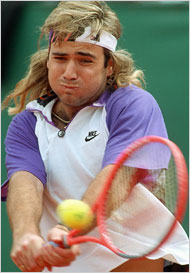sports
autobiography
dislike
exploitative
aspect
Nick Bollettieri
to be coming up
to be coming into
business
wheelbarrow
courts
finals
Alan King tournament
silver dollars
to get drunk with
visual
sparkling
from that day forward
there's no question about it
Eastern Europeans
the American dream
to push one's child
to send s.o. off
notorious
glorified
prison
toughness
harrowing
description
athlete
straight off
to raise oneself
unsupervised
barracks
strict rules
to be punished for
regiment
fatigue
to take a back seat to s.t.
to end up
a rigged system

designed to
unsuccessful
scholars
to educate oneself formally
conflict
to exist
environment
to go off to
Bradenton Academy
to be entitled to
remarkable
charter school
youth center
love-hate; hate-love
for the scale to be balanced
as far as...goes
to wake up in a life...
to find oneself in a place
lower-income neighborhoods
broken school system
horrifying thought
teammate
brilliant
co-writer
career
The Tender Bar: A Memoir
escape from
pressures
anticipation of
retirement
to phone s.o. up
to realize
though a Pulitzer's eyes
to set out on a journey together
to labor
Freud
psychology
routines
contradictions
message
to get to s.t.